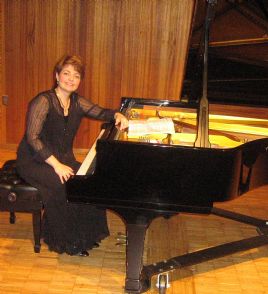|
Symphony
FROM THE NEW WORLD TO THE OLD WORLD
by Peter Lert
Saturday, June 14, 2025
Chamber
MC2 DUO RECITAL CLOSES 222'S SEASON
by Terry McNeill
Saturday, June 14, 2025
Choral and Vocal
CANTIAMO SONOMA'S LUSCIOUS A CAPELLA SINGING IN SEASON ENDING CONCERT
by Pamela Hicks Gailey
Sunday, June 8, 2025
Symphony
SRS SEASON ENDS WITH RESOUNDING TA-TA-TA-BANG
by Terry McNeill
Sunday, June 1, 2025
Symphony
YOUTHFUL VIRTUOSITY ON DISPLAY AT USO'S MAY CONCERTS
by Peter Lert
Saturday, May 17, 2025
Symphony
MYSTICAL PLANETS AND LIVELY GERSHWIN ORTIZ AT FINAL SRS CONCERT
by Peter Lert
Sunday, May 4, 2025
Symphony
VSO'S CONCERT MUSIC OF TIME, MUSIC OF PLACE
by Peter Lert
Sunday, April 27, 2025
VOCAL ELEGANCE AND FIRE AT THE 222'S RECITAL APRIL 26
by Pamela Hicks Gailey
Saturday, April 26, 2025
CANTIAMO SONOMA SINGS AN INSPIRED GOOD FRIDAY MOZART REQUIEM CONCERT
by Pamela Hicks Gailey
Friday, April 18, 2025
DRAMATIC SHOSTAKOVICH SYMPHONY CLOSES PHILHARMONIC'S 25TH SEASON
by Terry McNeill
Sunday, April 13, 2025
|
 |
 Ksenia Nosikova in Newman Auditorium Nov. 14 |
DRAMATIC SCHUMANN AND LISZT WORKS HIGHLIGHT NOSIKOVA RECITAL IN NEWMAN
by Terry McNeill
Sunday, November 14, 2010
Another chapter in the North Bay’s homage to the Schumann bicentennial occurred Nov. 14 when Russian pianist Ksenia Nosikova played two Schumann works in a Newman Auditorium recital filled with musical rarities.
Performing on the fourth Concerts Grand series event, Ms. Nosikova (faculty artist at the University of Iowa) began not with Robert but with Clara, playing the latter’s Notturno in F Major, a lyrical and often sentimental work. The piece received a deft reading with judicious tempos, legato pedaling and tonal richness. An early romantic piece, elegantly played.
Completing the first half was a quite different Schumann composition, Robert’s F Minor Sonata, Op. 14. This sprawling work needed all of Ms. Nosikova’s artistry to connect with the audience of 75. Ms. Nosikova chose the latest edition of the Sonata, written in 1836 and called a “Concerto Without Orchestra,” that includes five movements with two Scherzos. The music is dense, featuring cascades of notes juxtaposed with simple melodies, and difficult to keep together. The pianist clearly had spent long hours making sense of the gnarled music, her memory assisted by a reduced size score resting on the piano’s tuning pins. The dramatic intensity was underscored by gobs of powerful chords, lots of volume and often a monochromatic and clangorous sound. The audience frequently seemed more benumbed than entranced, and they signified appreciation of the pianistic heavy lifting with strong but not overwhelming applause. The Schumann Second is a work that needs more than a little sorcery to be an effective recital piece, and in the extended format, even with the artist’s sterling advocacy, the impact was diluted.
Four arcane Liszt transcriptions were programmed in the second half, a brave decision by the artist but ultimately providing a less-than-successful musical experience. Unlike Liszt’s reworkings of themes from “Rigoletto,” “Tannhaüser” or “Norma,” the operas of Gounod and Meyerbeer are little known today, and lack the cohesive architecture of the paraphrases and transcriptions that the Hungarian master lavished even on an opera as rare as “Simon Boccanegra.” Gounod’s “Queen of Sheba” (1862) and “Roméo et Juliette” (1865) provided some rich melodies, but the music tended to wander through many repeats and uninspired patches. Ms. Nosikova gave each her ample technical prowess and considerable sonority, though it was by no means a note-perfect performance. There are lots of balls in the air in these virtuosic transcriptions and they attract few virtuosi.
Meyerbeer’s “Le Moine” was the most charming work of the group, the themes beautifully etched by the pianist, whose cross-hand technique and manifold skips were perfectly secure. The printed program mistakenly listed another Meyerbeer work, “Illustrations” from “L’Africaine,” as part of “Le Moine” and caused confusion with some in the audience.
No encore was offered by Ms. Nosikova, something not surprising given the long and arduous program and a reception by listeners that was at times tenuous.
|

